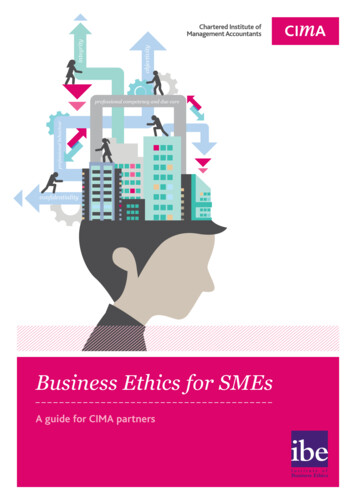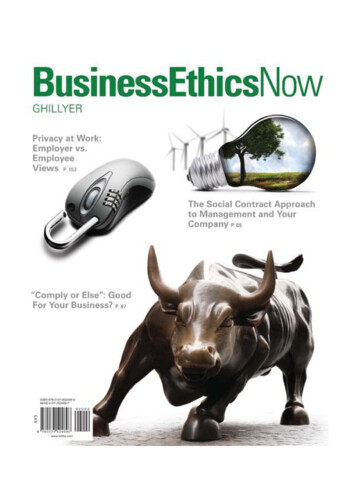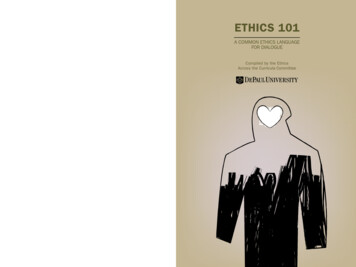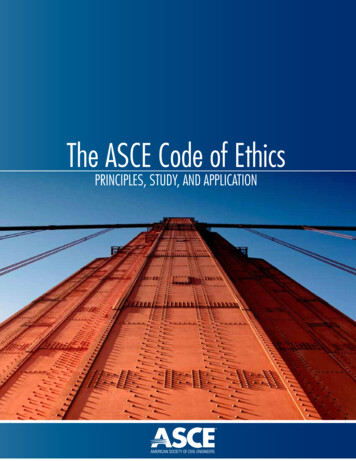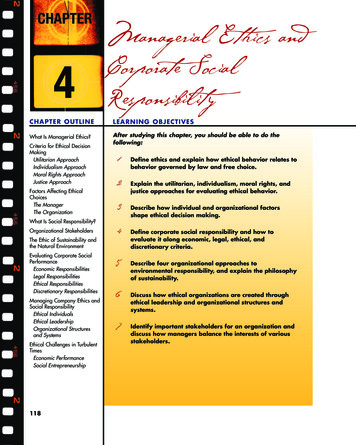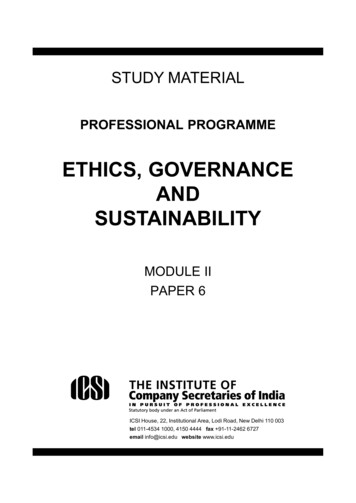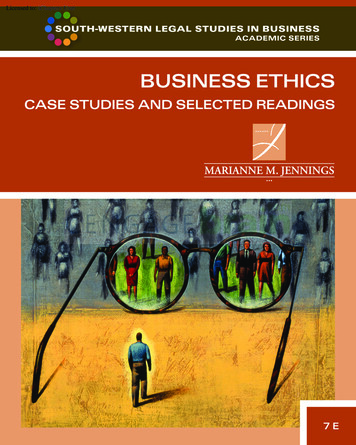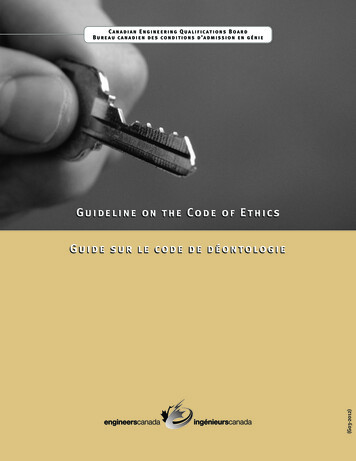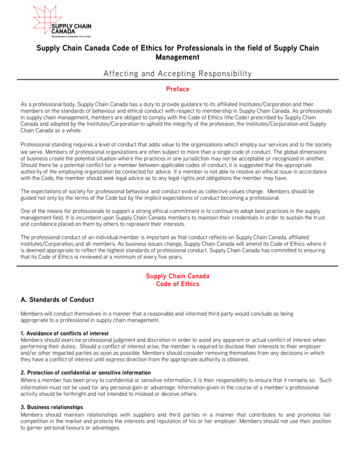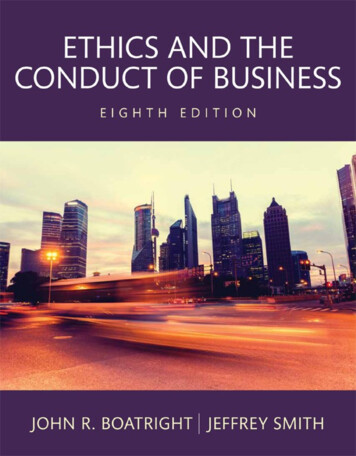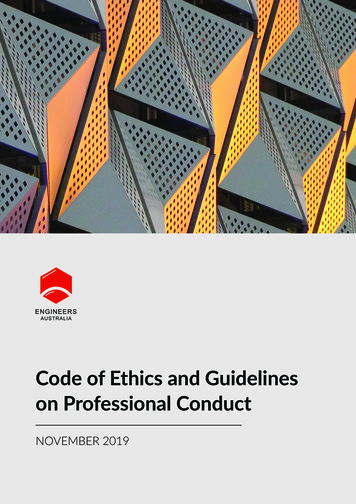
Transcription
Code of Ethics and Guidelineson Professional ConductNOVEMBER 2019
Code of EthicsAs engineering practitioners, we use our knowledge and skillsfor the benefit of the community to create engineering solutionsfor a sustainable future. In doing so, we strive to serve thecommunity ahead of other personal or sectional interests.Our Code of Ethics defines the values and principles that shape thedecisions we make in engineering practice. The related Guidelines onProfessional Conduct provide a framework for members of EngineersAustralia to use when exercising their judgment in the practice ofengineering and as members of Engineers Australia more broadly.As members of Engineers Australia, we commit to practise in accordance withthe Engineers Australia’s General Regulations regarding competency, continuingprofessional development and the Code of Ethics. We accept that we will be heldaccountable for our conduct under Engineers Australia’s disciplinary regulations.In the course of engineering practice we will:12Demonstrate integrityPractise competently1.1 Act on the basis of a well-informedconscience2.1 Maintain and develop knowledge and skills1.2 Be honest and trustworthy1.3 Respect the dignity of all persons.32.2 Represent areas of competence objectively2.3 Act on the basis of adequate knowledge.4Exercise leadershipPromote sustainability3.1 Uphold the reputation and trustworthinessof the practice of engineering4.1 Engage responsibly with the community andother stakeholders3.2 Support and encourage diversity4.2 Practise engineering to foster the health,safety and wellbeing of the community andthe environment3.3 Make reasonable efforts to communicatehonestly and effectively to all stakeholders,taking into account the reliance of others onengineering expertise.4.3 Balance the needs of the present with theneeds of future generations.Engineers Australia Code of Ethics and Guidelines on Professional Conduct2
Guidelines on Professional ConductThese Guidelines on Professional Conduct provide a framework for members of Engineers Australia to use.The Guidelines are not intended to be, nor should they be interpreted as, a full or exhaustive list of the situationsand circumstances which may comprise compliance and non-compliance with the Code of Ethics. If called uponto do so, members are expected to justify any departure from either the provisions or spirit of the Code.Ethical engineering practice requires judgment, interpretation and balanced decision-making in context.Engineers Australia recognises that, while our ethical values and principles are enduring, standards ofacceptable conduct are not permanently fixed. Community standards and the requirements and aspirationsof engineering practice and members’ behaviour more generally will develop and change over time. Asa minimum, members are to practise in accordance with the Engineers Australia’s General Regulationsregarding competency, continuing professional development and the Code of Ethics. Within limits,what constitutes acceptable conduct may also depend on the nature of individual circumstances.Allegations of non-compliance will be evaluated on a case-by-case basis andadministered in accordance with the disciplinary regulations.Demonstrate integrityPractise competently1.1 Act on the basis of a well-informed conscience2.1 Maintain and develop knowledge and skills(a)continue to develop relevantknowledge and expertiseact appropriately, and in a professional manner,when you perceive something to be wrong(b)act in a careful and diligent manner(c)seek peer review(d)give due weight to all legal, contractual andemployment obligations(d)support the ongoing developmentof others(e)act within your area of expertise(e)maintain continuing professionaldevelopment(a)be discerning and do what you think is right(b)act impartially and objectively(c)1.2 Be honest and trustworthy(a)accept, as well as give, honest and fair criticism(b)be prepared to explain your work and reasoning(c)give proper credit to those to whom proper credit is due(d)in managing perceived conflicts of interest, ensurethat those conflicts are disclosed to relevant parties(e)respect confidentiality obligations, express or implied(f)do not engage in fraudulent, corrupt, or criminalconduct2.2 Represent areas of competence objectively(a)practise within areas of competence(b)neither falsify nor misrepresentqualifications, grades of membership,experience or prior responsibilities2.3 Act on the basis of adequate knowledge(a)practise in accordance with legal andstatutory requirements, and with thestandards of the day accepted withinthe Engineers Australia community(b)inform employers or clients if a taskrequires qualifications and experienceoutside your areas of competence1.3 Respect the dignity of all persons(a)treat others with courtesy and without discriminationor harassment(b)apply knowledge and skills without bias in respectof race, religion, gender, age, sexual orientation,marital or family status, national origin, or mental orphysical abilitiesEngineers Australia Code of Ethics and Guidelines on Professional Conduct3
Exercise leadershipPromote sustainability3.1 Uphold the reputation and trustworthinessof the practice of engineering4.1 Engage responsibly with the communityand other stakeholders(a)advocate and support the extensionof ethical practice(b)engage responsibly in public debateand deliberation3.2 Support and encourage diversity(a)select, and provide opportunities for,all engineering practitioners and otherteam members on the basis of merit(b)promote diversity in engineering3.3 Make reasonable efforts to communicatehonestly and effectively to all stakeholders,taking into account the reliance of otherson engineering expertise(a)provide clear and timelycommunications on issues such asengineering services, costs, outcomesand risks(a)be sensitive to public concerns(b)inform employers or clients of the likelyconsequences of proposed activities onthe community and the environment(c)promote the involvement of allstakeholders and the community indecisions and processes that may impactupon them and the environment4.2 Practise engineering to foster the health,safety and wellbeing of the communityand the environment(a)incorporate social, cultural, health,safety, environmental and economicconsiderations into the engineering task4.3 Balance the needs of the present with theneeds of future generationsEngineers Australia Code of Ethics and Guidelines on Professional Conduct(a)in identifying sustainable outcomesconsider all options in terms of theireconomic, environmental and socialconsequences(b)aim to deliver outcomes that do notcompromise the ability of future life toenjoy the same or better environment,health, wellbeing and safety as currentlyenjoyed.4
Contact usEngineers Australia11 National Circuit, Barton ACT 2600(02) 6270 ersaustralia.org.autwitter.com/engaustralia /engaustralia
Engineers Australia Code of Ethics and Guidelines on Professional Conduct 2 Code of Ethics As engineering practitioners, we use our knowledge and skills for the benefit of the community to create engineering solutions for a sustainable future. In doing so, we strive to serve the
